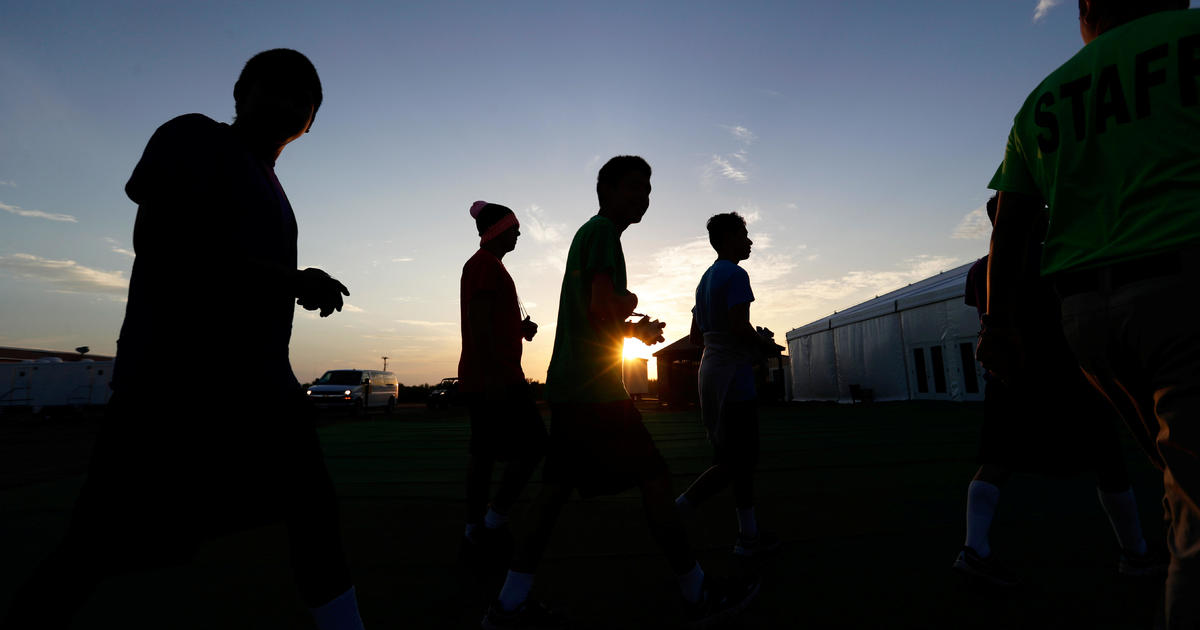Attorneys filed a lawsuit late Friday to try to halt the imminent expulsion of a group of migrant children previously detained at a south Texas hotel, the latest court challenge against a Trump administration policy that has barred most border-crossers — regardless of their age — from seeking U.S. asylum.
The lawsuit was filed in the U.S. District Court in Washington, D.C. on behalf of an unknown number of children in U.S. government custody previously held at a hotel in McAllen, Texas, this week.
Citing a directive from the Centers for Disease Control and Prevention, U.S. immigration officials are attempting to expel the minors, who arrived at the southern border without their parents, to their home countries, the lawsuit said.
“The Trump administration is holding children in secret in hotels, refusing to give lawyers access to them so it can expel them back to danger without even a chance for the children to show they warrant asylum,” Lee Gelernt, an attorney at the American Civil Liberties Union, which filed the lawsuit, told CBS News. “Unfortunately this is just the latest in a series of steps taken by the Trump administration to abuse and terrorize children.”
The lawsuit said that immigration officials have declined to say how many children were being held at the McAllen hotel as of Thursday and to provide their names. The advocates are also asking the federal court in Washington to require the Department of Homeland Security to allow the children an opportunity to talk to lawyers.
The Texas Civil Rights Project, which has been identifying families and children U.S. officials seek to expel, joined Friday’s lawsuit as the children’s “next friend.” The Center for Gender and Refugee Studies, Oxfam and the ACLU chapters in Texas and Washington, D.C., also served as counsel.
Late Friday, Hilton confirmed that the hotel, the Hampton Inn & Suites in McAllen, was no longer housing any migrants in U.S. custody. The hotel giant said it was in the process of instructing all franchises and management companies to not rent rooms for the purposes of holding children and families in U.S. immigration custody.
“Our policy has always been that hotels should not be used as detention centers or for detaining individuals. We expect all Hilton properties to reject business that would use a hotel in this way,” the company said in a statement.
Gelernt applauded Hilton’s decision: “We are pleased the hotels are pushing back against this inhumane expulsion policy and we hope that the government reconsiders this practice.”
It is unclear where the children who were previously at the McAllen hotel were as of late Friday.
The policy being challenged has effectively sealed the country’s border to most migrants without proper documents. Since March, U.S. border officials have carried out more than 72,000 summary expulsions. More than 2,000 unaccompanied children have been removed from the country.
Officials say the CDC’s public health directive is designed to prevent potentially infected migrants from spreading the coronavirus inside the U.S. Instead of placing migrants in deportation proceedings under immigration law, the government is removing them from U.S. soil under public health law, calling the process an “expulsion.”
The Trump administration has used the order to suspend the legal protections Congress created for children who arrive at the border unaccompanied.
Under several laws, unaccompanied migrant minors are shielded from expedited deportations and border officials must generally transfer them to the U.S. refugee agency, which oversees shelters and housing facilities where the children stay while awaiting their release to family members in the U.S. or other sponsors.
In June, Homeland Security officials transferred just 61 unaccompanied minors — or less than 4% of the more than 1,650 apprehensions that month — to the Office of Refugee Resettlement, according to government data first reported by CBS News last week. Before the CDC edict took effect, the agency received an average of more than 70 migrant children daily.
The use of hotel rooms to detain children and families, a common practice before the pandemic, has become more widespread in recent months because of the policy. That’s because Customs and Border Protection (CBP) officials are not transferring these migrants to long-term detention centers or shelters — they are instead turning them over to Immigration and Customs Enforcement (ICE) so that agency can expel them.
ICE contracts out to a company called MVM, Inc., to transport and house unaccompanied minors and families with children in hotel rooms before their removal.
ICE officials told CBS News the contractors are not law enforcement officers and that they are trained to properly care for minors and uphold their rights under the landmark Flores Settlement Agreement. In a statement earlier this week, ICE spokesperson April Grant said the agency could not elaborate further on the use of hotels to hold migrants because of ongoing litigation.
Hotels in McAllen, Phoenix and El Paso were used more than 180 times in April and June to hold unaccompanied migrant minors, according to data obtained by CBS News and first reported by the Associated Press. At least 169 children in ICE custody, including infants, were booked in hotel rooms during those two months. The statistics, which the government provided to the National Center for Youth Law, did not include figures for May.
The ACLU has already filed similar lawsuits on behalf of three unaccompanied migrant minors initially processed under the CDC directive. The group was successful in halting the expulsions of two of them, while the other, a 13-year-girl who had fled gang threats in El Salvador, had already been expelled when the lawsuit was filed. All of them were held in hotel rooms after being apprehended by border officials.
During a hearing for one of those cases, a federal judge appointed by President Trump said the expulsions policy was likely not authorized by public health law and violated legal protections for unaccompanied children.
